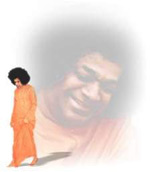|
Sunday, Jan 25 2026
KARMA - 20 FEB 2006
My humble pranams at the Divine Lotus Feet of Swami.
Sai Ram uncles, aunties, gurus, brothers and sisters. I am Bro Arjun and my topic for today is ‘Karma”.
The law of cause and effect forms an integral part of Hindu philosophy. This law is termed as 'karma', which means to 'act'. Karma is what differentiates human beings and distinguishes him from other creatures of the world.
The theory of karma says that every action produces an equal and opposite reaction. Every time we think or do something, we create a cause, which in time will bear its corresponding effects. And this cyclical cause and effect generates the concepts of samsara (or the world) and birth and reincarnation. It is the personality of a human being or the jivatman - with its positive and negative actions - that causes karma.
Karma could be both the activities of the body or the mind, irrespective of the consideration whether the performance brings fruition immediately or at a later stage.
Every person is responsible for his or her acts and thoughts, so each person's karma is entirely his or her own. It is in the hands of an individual to shape his own future by schooling his present.
Hindu philosophy, which believes in life after death, holds the doctrine that if the karma of an individual is good enough, the next birth will be rewarding, and if not, the person may actually devolve and degenerate into a lower life form. In order to achieve good karma it is important to live life according to dharma or what is right.
According to the ways of life chosen by a person, his karma can be classified into three kinds. The satvik karma, which is without attachment, selfless and for the benefit of others; the rajasik karma, which is selfish where the focus is on gains for oneself; and the tamasik karma, which is undertaken without heed to consequences, and is supremely selfish and savage.
According to Gandhi, the tamasik works in a mechanic fashion, the rajasik drives too many horses, is restless and always doing something or other, and the satvik works with peace in mind.
According to the scriptures, the discipline of unattached action (Nishkâma Karma) can lead to salvation of the soul. So they recommend that one should remain detached while carrying out his duties in life. As Lord Krishna said in the Gita: "To the man thinking about the objects (of the senses) arises attachment towards them; from attachment, arises longing; and from longing arises anger. From anger comes delusion; and from delusion loss of memory; from loss of memory, the ruin of discrimination; and on the ruin of discrimination, he perishes.
Jai Sai Ram
Bro Arjun |

